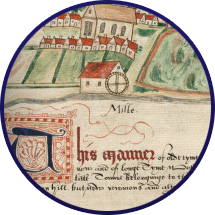Everyday Life in a Northumbrian Manor

Glossary of Terms
The following is a glossary of terms associated with manorial documents.
This is a document or entry in a court roll ‘admitting’ a tenant to their copyhold tenancy.
This was usually two individuals, appointed to decide the fine taken from those who commit an offence. Afferors could assess the fines imposed and did sometimes reduce them.
A fine resulting from not following the customs and laws of the manor.
Official within the manor who oversaw much of the day-to-day running of the manor. They were sometimes in charge of more than one manor and could hold the position as one of the terms of their tenancy.
A register of attendance for the manor.
This court was held by the lord/lady of the manor, and focused on the manorial customs, including enforcement of fines, and manorial services.
This dealt with offences which went beyond manorial customs, usually focusing on minor criminal offences such as theft or blood and affray. The ‘assize of bread and ale’ may be included, meaning quality checking the above. This could also include the appointment of constable.
A volume including minutes of the courts.
A roll or sheet of paper detailing the minutes of the court. There is a common format for these, with the manor, type of court, name of the lord, date and steward’s name at the top, then the jurors’ names, presentments of court, and then surrenders of land.
This is a form of landholding within manors, with the name stemming from the fact that copyhold tenants would have a ‘copy’ of the court roll detailing their admission to the land.
The land was held by the lord/lady of the manor, but tenants could be admitted to live on the land. If the tenant wanted to sell or even leave their land to their heirs, it had to first be surrendered to the lord/lady, and any fines imposed at the Court Baron. These documents contain proof of title and led to the protection of manorial documents by law (Law of Property Act 1922).
Manorial customs are the rules by which the manor was administered.
A rented farm with arable land.
Land farmed by or on behalf of the lord/lady of the manor.
Details of fines and other financial matters generally abstracted from Court Rolls by the Steward. The fines were usually subsequently levied and collected by the manorial bailiffs.
An excuse for not attending the court. This often included a small payment.
Freeholder tenants held their land from the lord for a monetary rent. Effectively the land was held outright, without being subject to the customs of the manor.
In manorial terms this refers to a section of land which has been divided into parts or shares.
A written description of the manorial boundaries, usually completed by individuals walking or riding around those boundaries and identifying the edges. Perambulations of the bounds were also an opportunity to ensure no encroachments on that land.
An official appointed to impound livestock.
A large jurisdiction granted by a monarch to one of his more powerful subjects. The term is associated more commonly with Scottish history.
A topographical survey of the manor.
A homestead or dwelling house with associated outbuildings.
A system to upkeep the peace of the manor in connection with the Court Leet. Originally a group of ten men would have agreed to be mutually responsible for following the law and order in the manor, though over time it became more symbolic of the rights of the court leet.

